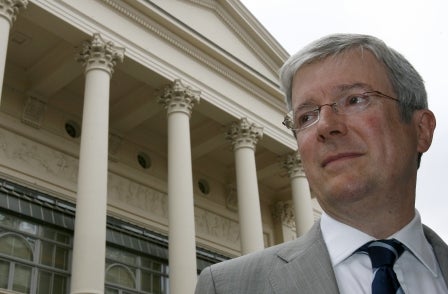
The Dyson report exposes a pattern in the way the BBC deals with scandals and mistakes. Those who fail to expose and address wrongdoing at the BBC, whilst protecting its reputation, fail upwards. Those who blow the whistle are victimised for seeking to bring the corporation into dispute.
With £3.5bn a year of public money at stake there is a huge incentive for BBC insiders to protect the mothership. They are also quite possibly motivated by the more noble idea that the BBC is overwhelmingly a force for good and worth protecting.
But the Dyson report exposes a rotten corporate culture which the contrite statements and apologies of this week don’t really address.
As ever, no one has been held personally accountable for what went wrong.
Martin Bashir built a glittering and highly-paid journalism career off the back of his Diana scoop. The truth, as exposed by the Mail on Sunday in 1996, that he falsified bank statements to help secure the interview, should have ended his career as a serious journalist.
Instead, he went on to win fame and riches in the US and was re-employed by the BBC in 2016.
Dyson makes clear in his report that Bashir dishonestly created the faked bank statements, then lied about doing it and then dissembled again in evidence to this new report.
Bashir resigned from the BBC for medical reasons and his statement yesterday suggests he remains in denial about what he did: “The bank statements had no bearing whatsoever on the personal choice by Princess Diana to take part in the interview.”
The report finds that Lord Hall failed “woefully” to investigate the matter at the time, in his then role as managing director of news and current affairs.
He accepted Bashir’s account, even though he knew the journalist had lied about elements of it and Hall did not bother to check with Earl Spencer (who would have revealed his view, as told to Dyson, that Bashir was “a fantasist or a fraud”.
Hall failed upwards in spectacular fashion, becoming director-general of the BBC. If he had not left his post last year he would surely have resigned yesterday.
Other BBC executives who were charged with investigating the Bashir affair and failed to do so – the late Steve Hewlett, Tim Suter, Tim Gardam and Anne Sloman – all went on to have illustrious careers.
What of the whistleblowers: the graphic designer Matt Weissler who was asked to fake the bank statements and who was first to raise internal alarm bells? And Mark Killick, the Panorama reporter who raised concerns with his editor Hewlett and who was slapped down for his pains?
The most chilling section of the Dyson report for me is Lord Hall’s report to Lord Birt following a meeting he held with Bashir and Anne Sloman (Tim Gardam’s successor as head of weekly news programmes) in April 1996.
He said: “We are taking steps to ensure that the graphic designer involved— Matthew Weissler —will not work for the BBC again (when a current contract expires in the next few weeks).
“In addition, between now and the summer, we will work to deal with leakers and remove persistent troublemakers from the programme.”
So the two whistleblowers, Killick and Weissler, were both fired and Bashir was not even given a reprimand.
Killick told PA yesterday: “When the BBC dismissed us, run a smear campaign and then the cover-up, lots and lots of people in the BBC at the time knew that.
“And it sent a message to the whole of the BBC staff: don’t whistleblow if there’s a problem with the BBC. If you do you could lose your job.”
The Dyson report states that the BBC press office dishonestly briefed that “it suspected that stories about fake bank statements were being leaked by jealous colleagues”.
And so the cover-up went on, for 25 years, until more questions from the press – and Earl Spencer’s decision to break his silence – finally forced the corporation to address the scandal.
Sadly, the culture of punishing whistleblowers continued after 1996 – most shockingly following the Savile scandal and the decision to suppress the 2011 Newsnight investigation which exposed the truth about the DJ.
Writing for Press Gazette in 2015, investigative journalist Meirion Jones explained how those who sought to expose Savile, and who tried to sound alarm bells over the decision to stop the broadcast of the Newsnight investigation, were sidelined and encouraged to leave the BBC. Namely himself, and Newsnight colleague Liz MacKean.
Tom Giles, the Panorama editor behind the excoriating “What the BBC Knew” documentary was also “squeezed out” Jones said.
The Newsnight editor who took the decision to spike the Savile investigation, Peter Rippon, remains at the corporation as editor of the BBC Archive and Connective Studio: “A central role at the heart of the biggest challenge for the BBC in the next ten years – digital transformation.”
As with the events of 1996, the vast BBC press office did not come out well from the Savile scandal.
James Hardy, the BBC head of communications for BBC News who said in an email to a colleague he would “drip poison” about Jones, stayed at the BBC until 2016 and is now director of communications at Cambridge University.
The BBC may have acted no differently from any other corporation or company which will seek to defend itself when facing a damaging crisis.
But given its dominant role in the UK media and national conversation, and the fact it is paid for with public money, it should and must do better.
Email pged@pressgazette.co.uk to point out mistakes, provide story tips or send in a letter for publication on our "Letters Page" blog
